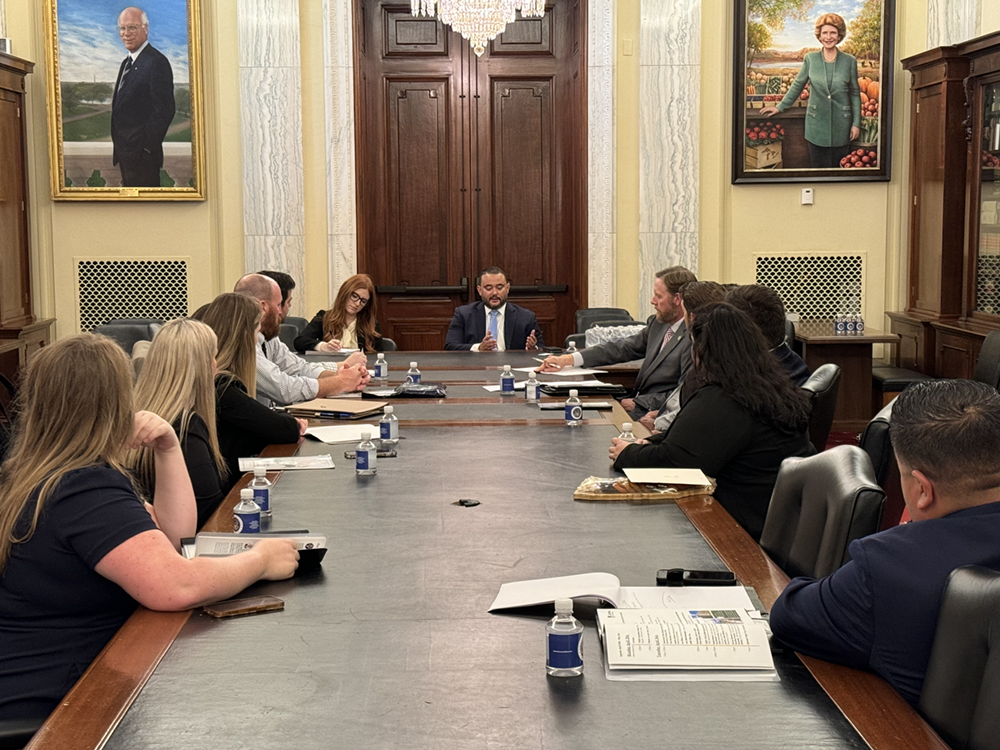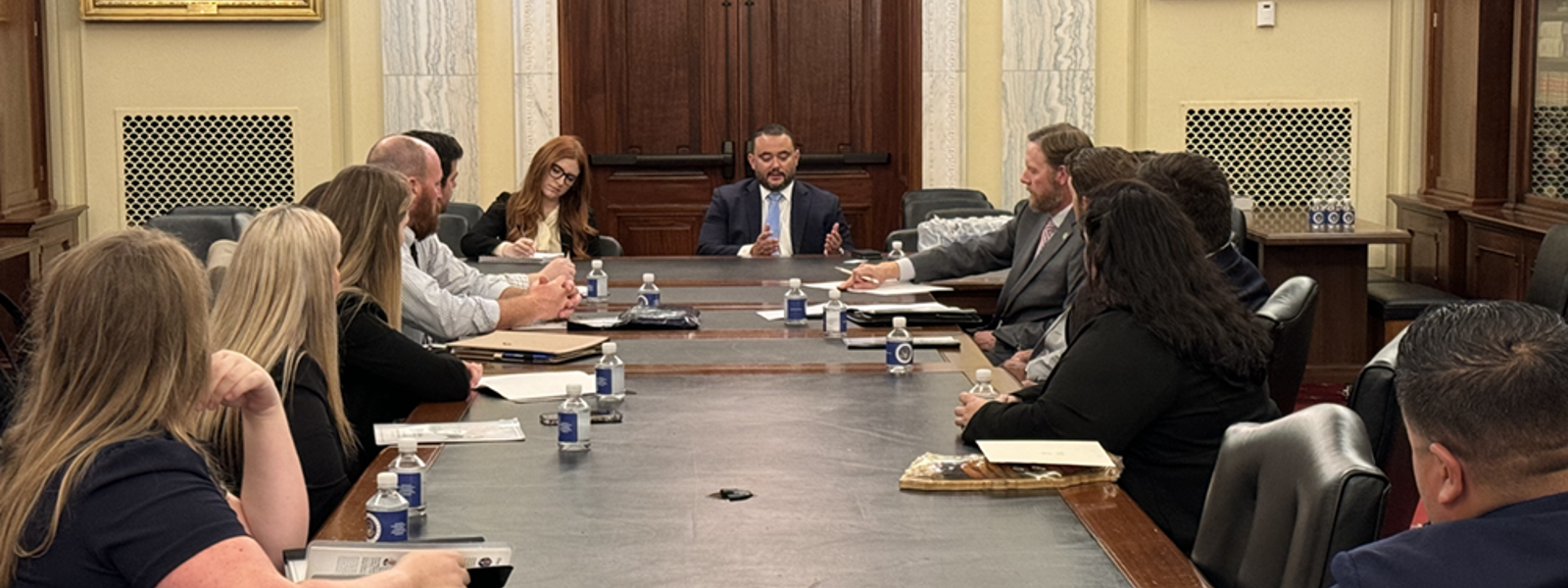Farm Bureau advocates for passage of 2024 Farm Bill

Traveling to Washington, D.C. to advocate on the 2024 Farm Bill and other policy issues, a California Farm Bureau delegation, including the Leadership Farm Bureau class, meets with John Newton, center, chief economist for the Senate Committee on Agriculture, Nutrition and Forestry.
Photo/Matthew Viohl

Photo/Erin Huston
By Christine Souza
Leaders of the U.S. House of Representatives and U.S. Senate agriculture committees released title-by-title frameworks of the 2024 Farm Bill, omnibus legislation to support the nation’s farmers and ranchers through a variety of safety-net, farm-loan, conservation and disaster-assistance programs.
The 2018 Farm Bill, originally set to expire in 2023 but extended last year, comes up for renewal in September. The latest farm bill outlines were released May 1.
The California Farm Bureau board of directors, members of this year’s Leadership Farm Bureau class and the organization’s federal policy team were in Washington, D.C., early this month, meeting with lawmakers and staff to advocate on issues, including the farm bill.
Noting that farmers face a challenging economy with low commodity prices, high inflation and rising input costs, California Farm Bureau First Vice President Shaun Crook said passing a 2024 Farm Bill this year is critical.
“It is important to increase baseline funding for all programs because we in agriculture are in a drastically different economic environment in 2024 than we were in 2016 when the last farm bill was negotiated,” said Crook, a Tuolumne County forester and logger.
Rep. Glenn “GT” Thompson, R-Pa., chairman of the House Committee on Agriculture, released the committee’s outline for the legislation, which guides U.S. farm and nutrition policies. The document includes investments in the farm safety net, conservation, research and forestry.
“Each title of this farm bill reflects a commitment to the American farmer and viable pathways to funding those commitments and is equally responsive to the politics of the 118th Congress,” Thompson said in a statement.
The House Committee on Agriculture is expected to release final language this week and consider amendments during a bill markup set for May 23.
Sen. Debbie Stabenow, D-Mich., chair of the Senate Agriculture, Nutrition and Forestry Committee, released the committee framework, the Rural Prosperity and Food Security Act. It includes investments in the farm safety net, the Supplemental Nutrition Assistance Program, or SNAP, climate-smart conservation practices and addresses foreign ownership of farmland.
“This is a serious proposal that reflects bipartisan priorities to keep farmers farming, families fed and rural communities strong,” Stabenow said in a statement. “The foundation of every successful farm bill is built on holding together the broad, bipartisan coalition of farmers, rural communities, nutrition and hunger advocates, researchers, conservationists and the climate community.”
In California Farm Bureau discussions with lawmakers in the nation’s capital, “members of our delegation reminded them that waiting another year to pass a farm bill is very much to our detriment,” said Matthew Viohl, Farm Bureau’s director of federal policy.
“It may be easy to kick the can down the road with short-term extensions, but the consequences are real for farmers in California and across the country,” Viohl added.
Discussions with lawmakers, he said, reflected a general uncertainty about what could be accomplished during a presidential election year. “Each office has its own different outlook on what they think might happen. Some are very hopeful and some not hopeful at all,” Viohl said.
However, despite the uncertain political landscape, Viohl said, “it was a very productive advocacy trip,” adding that lawmakers appreciate hearing from farmers who provide a “boots-on-the-ground perspective” on federal policies.
Sutter County rice grower Sy Honig of Robbins, a member of the Leadership Farm Bureau class, said the delegation emphasized that federal crop insurance needs to be expanded in the farm bill to include more specialty crops.
“We grow more than 400 varieties of crops in California and only a fraction of those are covered,” Honig said. “Expansion of crop insurance for crops that are not typically covered could help (for example) those farming small grains and specialty rice.”
Honig said politicians from both parties were receptive to suggestions brought by California farmers and acknowledged that they are trying to pass the farm bill this year. “They’re trying to work through their differences,” Honig said.
Each framework, Viohl said, contains improvements for farmers and ranchers with expansion of crop insurance protections, particularly for specialty crop producers, an expansion of the Environmental Quality Incentives Program and more money for trade and market access programs.
Other priorities for California farmers, he said, include expanded risk-management tools and programs, fixes to adjusted gross income limits, an updated definition of rural, support for the U.S. Department of Agriculture and more robust forestry programs.
A key sticking point to negotiations, Viohl said, is nutrition program funding, which represents more than 80% of the total cost of the farm bill. The 2024 Farm Bill is estimated to cost $1.5 trillion for 10 years, Viohl said.
“Changes to the nutrition title remain a key roadblock between both sides, with Democratic leaders suggesting the Republican proposals on adjusting the base food plan for SNAP recipients are a complete nonstarter,” Viohl said. “In theory, if they haven’t passed the farm bill by November, they have a window of about a month and a half to get this done in the lame duck period.”
In a statement, American Farm Bureau Federation President Zippy Duvall said the House and Senate agriculture committee proposals acknowledge that programs used by farmers and ranchers require additional investment in the face of falling commodity prices and increased inflation.
“While there will inevitably be disagreements on specific provisions and funding levels of several programs, we encourage both chairs to hold a markup this month,” Duvall said. “We urge lawmakers on both sides of the aisle to work together in a bipartisan manner to find consensus and pass a farm bill before the extension expires this year.”
Reflecting on his first trip to the nation’s capital, Honig said, “It was really eye-opening to be in Washington, D.C., and see where everything gets done and just to talk to the politicians.
“It was a really incredible experience,” he added. “I had several congressmen ask me specifically about my family operation. I think that they want to learn so that they can try to represent us better.”
(Christine Souza is an assistant editor of Ag Alert. She may be contacted at csouza@cfbf.com.)




